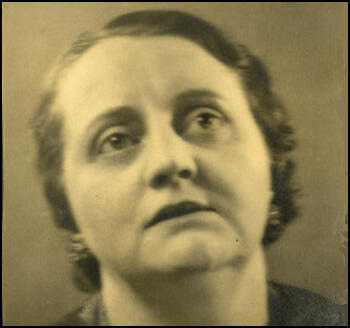Winifred Batho
Winifred Batho, the daughter of Arthur John Batho, a postal telegraph clerk, was born in Sheffield on 9th August 1887. Her parents were members of the Wicker Congregational Church. Her father sailed to South Africa on the SS Durban in 1890 hoping to cure his tuberculosis, but, shortly after being joined by his family, he died and was buried in May 1891.
Batho returned to England and in 1907 she enrolled at the Sheffield School of Art. Batho joined the Women's Social and Political Union and disrupted a speech by Winston Churchill in 1909 by shouting "votes for women".
On 11th August 1911 she married Frank Horrabin, and in the same year he moved to London to work on the Daily News where he created the cartoon character of Japhet Noah. The couple were both socialists and became members of the Fabian Society and the Plebs' League. In 1912 Batho published a paper in which she argued that only the destruction of private property would release women from economic slavery. Batho became a Guild Socialist in 1915 and wrote a play, Victorian Love Story: Beloved Good, about Thomas Carlyle and his wife, Jane.
In 1920 Batho became a founder member of the Communist Party of Great Britain. Other early members included Tom Bell, Willie Paul, Arthur McManus, Frank Horrabin, Harry Pollitt, Rajani Palme Dutt, Helen Crawfurd, A. J. Cook, Albert Inkpin, J. T. Murphy, Arthur Horner, Tom Mann, John R. Campbell, Bob Stewart, Shapurji Saklatvala, William Mellor, George Aitken, Sylvia Pankhurst and Robin Page Arnot.
Batho became a follower of Stafford Cripps, the leader of the left-wing of the Labour Party. Other members of this group included Aneurin Bevan, Frank Wise, Frank Horrabin, Jennie Lee, Harold Laski, William Mellor, Barbara Betts and G. D. H. Cole. In 1932 the group established the Socialist League. During this period her husband began an extramarital affair with Ellen Wilkinson.
With the rise of Adolf Hitler in Nazi Germany, Batho became convinced that the Labour Party should establish a United Front against fascism with the Communist Party of Great Britain and the Independent Labour Party. In April 1934 William Mellor had a meeting with Fenner Brockway and Jimmy Maxton, two leaders of the ILP, "to talk over ways and means of securing working-class unity". He also had meetings with Harry Pollitt, the General Secretary of the Communist Party of Great Britain.

Winifred Batho
In January 1937 Stafford Cripps and George Strauss decided to launch a radical weekly, The Tribune, to "advocate a vigorous socialism and demand active resistance to Fascism at home and abroad." Mellor was appointed editor and others such as Barbara Betts, Aneurin Bevan, Ellen Wilkinson, Harold Laski, Michael Foot and Noel Brailsford agreed to write for the paper. Batho reviewed films and books for the journal.
William Mellor wrote in the first issue: "It is capitalism that has caused the world depression. It is capitalism that has created the vast army of the unemployed. It is capitalism that has created the distressed areas... It is capitalism that divides our people into the two nations of rich and poor. Either we must defeat capitalism or we shall be destroyed by it." Stafford Cripps wrote encouragingly after the first issue: "I have read the Tribune, every line of it (including the advertisements!) as objectively as I can and I must congratulate you upon a very first-rate production.''
Winifred Batho also wrote for Time and Tide. She had a weekly column in the Manchester Evening News under the nom de plume of Freda Wynne. She underwent a hysterectomy in February 1939. During this period Frank Horrabin began an extramarital affair with Margaret Victoria McWilliams. On 13th October 1947 the marriage was dissolved. Horrabin lived and worked for six months in Jamaica before moving to Blackheath in 1950.
Batho's biographer, Amanda L. Capern, wrote: "Her final years were marred by loneliness and a deep sense of failure. In 1951 her elder brother, Arthur (Artie) Denton Batho, died, leaving her without family, and she never fully recovered from the dissolution of her marriage."
Winifred Batho died at her home, Sandycross, Ridgeway Road, Dorking, Surrey, on 24th June 1971.

